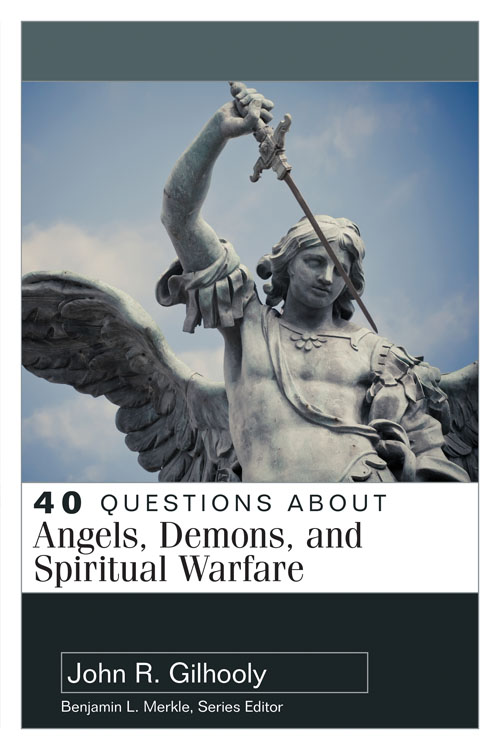
Spiritual warfare is a theological term used to describe the ongoing battle between the church and the Devil and his angels. The term is not used in the Bible but is derived from a conception of the struggle of the Christian life. Paul writes that “we do not wrestle against flesh and blood, but against the rulers, against the authorities, against the cosmic powers over this present darkness, against the spiritual forces of evil in the heavenly places” (Eph. 6:12 ESV). The cosmic struggle he describes is the struggle to which “spiritual warfare” generally refers.
Of course, like many theological terms, the history of its usage shows that it has shifted in its emphases, depending on the situation. In some Pentecostal and charismatic circles, the term refers specifically to the battle between a Christian and evil spirits (demons). In this setting, spiritual warfare is understood in the context of “deliverance” ministries, in which the goal is often an exorcism of some kind. Deliverance ministries, however, are generally considered among charismatics to be broader than exorcism. Likewise, spiritual warfare is something broader than deliverance ministries.
The origin of the term spiritual warfare seems to date to the 1970s. Some scholars have attributed its first usage to Michael Harper (1931–2010), who used the term as the title of his book on the Christian’s struggle with Satan in daily life.1 However, the general concept that God and the Devil struggle over the world and human souls in particular has been expressed in warfare terminology in English as early as John Bunyan’s Holy War (1682). In Christian fiction, the concept is found as early as Prudentius’s Psychomania (AD 384). Even Origen uses the terminology (AD 180). Of course, the Bible also uses warfare terminology to describe the struggle of the Christian life throughout the New Testament (see Eph. 6:10; 1 Tim. 6:12; Heb. 4:12).
Spiritual warfare is not a distinct brand of Christian ministry. There is not a peculiar gift for “deliverance ministry” or “spiritual warfare” distributed to some by God and not to others. In fact, exorcism is not listed in any of Paul’s outlines of the spiritual gifts, nor is it mentioned in any of the New Testament letters. Although it is true that his lists are not intended to be exhaustive, it is curious that Paul does not mention the power to bind demons if such power was intended to be an intrinsic feature of Christian ministry. Paul does intimate that the Christian faithful are involved in an ongoing struggle with spiritual powers (Eph. 6:10–18), but he does not say anything of significance about personal struggles with individual demons—a fact you would never guess from a casual reading of many contemporary books on spiritual warfare.
Nevertheless, the universal commands to resist the spiritual powers of darkness in the New Testament extend to all the faithful. Hence James says to his readers, “Resist the devil, and he will flee from you” (James 4:7 ESV). Peter offers the same command (1 Peter 5:8–9). The power for this resistance does not come from some superadded gifting but from the presence of the Holy Spirit in the lives of believers (Luke 11:20; 2 Cor. 10:3–4). The subjection of demonic influences to the Christian is based on the status of the Christian (Luke 10:20). To see that this is the case, we need only compare the effect of the rebukes of the disciples sent out by Jesus (Luke 10:17) with the effect of the self-appointed exorcists at Ephesus (Acts 19:12–17). In fact, Luke is careful to demonstrate through several episodes in Acts that the gospel of Jesus Christ is greater in power than the power of magic or demons (see Acts 8).2
Models
In my book, I discuss a few specific models or views of spiritual warfare in more detail. For now, it is helpful to sketch out some ways in which the term is used. One way to distinguish between approaches to spiritual warfare is to discuss “high-level” and “low-level” strategies. High-level strategies focus on locating and confronting “territorial spirits” who are conceived to be demonic agents that have control over large areas (cities or even nations). Methods for this strategy involve spiritual mapping and “identificational repentance.” Proponents of such strategies typically identify with the Strategic-Level Spiritual Warfare movement initiated by C. Peter Wagner and a handful of others in the early 1990s.
There are others who envision a similar high-level strategy, but one that focuses on oppressive and unjust institutions. The reason they focus on institutional and systemic injustices is because they take language about demons and the Devil in the Bible metaphorically. Such approaches are broadly captured beneath the World Systems model of spiritual warfare, associated with the influential writings of Walter Wink.
In contrast to these high-level strategies, low-level strategies focus on individual encounters with the demon-possessed, or with occult practices that give rise to demonic activity in a particular area. These strategies are likewise associated with members of the Strategic-Level movement as well as the many deliverance ministry movements. A contrasting low-level strategy is the model of spiritual warfare that focuses on an individual’s struggle against the flesh, or with the development and spiritual maturity of local churches. This last model is the one best attested to by the injunctions and emphases of the New Testament.
On the one hand, then, a debate among writers on spiritual warfare is whether we ought to believe and be concerned about the presence of real, personal demons (Satan and his angels) or merely with unjust practices and institutions that are “demonic” metaphorically. Among those who accept that the Bible teaches that the Devil and his angels are real, personal beings, there is a debate about whether certain spiritual warfare practices (such as spiritual mapping) are justifiable biblically, and whether spiritual warfare literature pays undue attention to the Devil rather than the war with the flesh.
Summary
The term spiritual warfare is ironically a contested term, but several principles are clear biblically. First, any power over sin, the world, and the Devil comes only by way of the blood of Christ. Spiritual warfare must begin with personal holiness which is achievable only by believing the gospel and pursuing our Lord. From there, discernment is needed to discuss the nature of demonic or angelic visitations, but the evidence for territorial spirits and various “warfare practices” such as binding demons or breaking seals is limited almost solely to anecdotes. While it is true that Western Christians have a tendency to deny spiritual activity—or at least, to be predisposed to materialist interpretations of “strange” events—it is equally true that Christians from polytheist or animist societies are predisposed to spiritualist interpretation. All of our experiences must be tested against the Word of God.
Finally, we should not believe the lie that spiritual warfare is for “super Christians.” All Christians are born again into an ongoing struggle against dark powers and sin. Whatever else it may involve, spiritual warfare is a corporate engagement of the church that involves all of God’s people. The “low-level” strategy of obedience to God’s commands and the pursuit of personal holiness are sine qua non for spiritual warfare. Furthermore, we can all pray.

1. Michael Harper, Spiritual Warfare (London: Hodder & Stoughton, 1970). Harper rejected the term “deliverance ministry” and the concomitant idea that anyone should specialize in such a ministry.
2. See Susan R. Garrett, The Demise of the Devil: Magic and the Demonic in Luke’s Writings (Minneapolis: Fortress, 1989) for a discussion of these themes.

